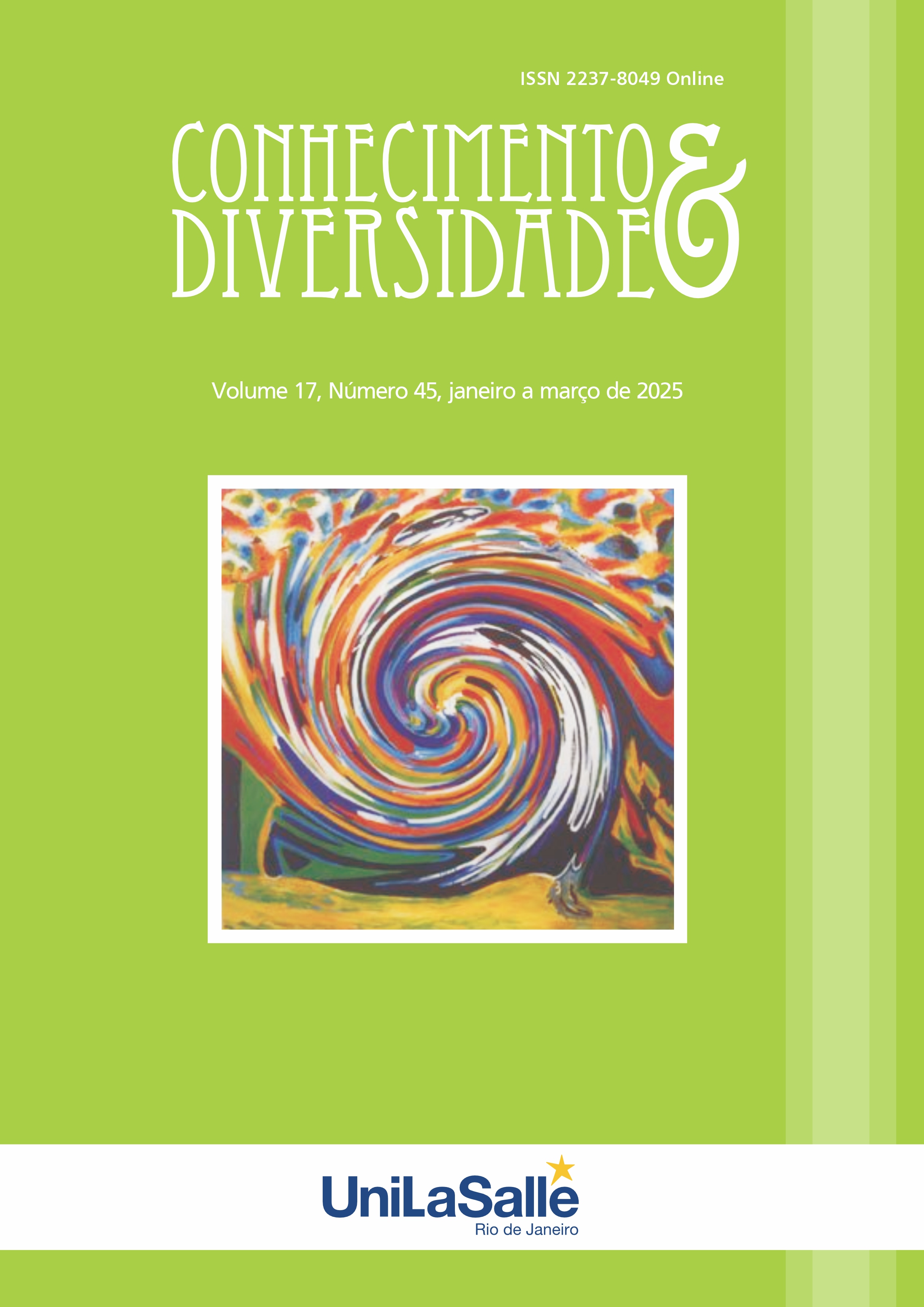A EDUCAÇÃO VIETNAMITA DURANTE A ÉPOCA FEUDAL
INFLUÊNCIAS SIGNIFICATIVAS DA EDUCAÇÃO CONFUCIONISTA
DOI:
https://doi.org/10.18316/rcd.v17i45.12391Palavras-chave:
Confucionismo, Era feudal, Classe intelectual, Cultivo Moral, Educação vietnamitaResumo
Este artigo explora o impacto significativo do confucionismo na educação vietnamita durante a era feudal, que se estendeu de 939 a 1945. O confucionismo, introduzido através da influência chinesa, gradualmente se incorporou aos sistemas político, social e educacional do Vietnã. A filosofia confucionista da educação, que enfatiza o desenvolvimento moral, a hierarquia e a estabilidade social, moldou o sistema educacional vietnamita ao fomentar a formação de indivíduos virtuosos e de funcionários para a governança. Este estudo investiga a evolução dos ideais educacionais confucionistas, sua integração com a cultura tradicional vietnamita e sua influência na criação de um sistema burocrático que apoiava a governança do Estado feudal. Apesar de suas contribuições, a educação confucionista também apresentava limitações, particularmente em seus métodos rígidos e baseados na memorização, que prejudicavam a criatividade e o pensamento crítico. O artigo pretende oferecer uma análise abrangente do impacto duplo – tanto positivo quanto negativo – da educação confucionista na sociedade vietnamita.
Referências
Do, Trang. 2023. "Humboldt's philosophy of university education and implication for autonomous education in Vietnam today", Perspektivy nauki i obrazovania 62 (2): 549-561. https://doi.org/10.32744/pse.2023.2.32.
Do, Trang, and Huy Quang Ngo. 2023. "Patriotism: The Philosophical Foundation of the Vietnamese People and its Manifestations in the Rural Villages", ISVS e-journal 10 (4): 119-133, http://isvshome.com/pdf/ISVS_10-4/ISVSej_10.4.8.pdf.
Doan, Trung Con, ed. 1950. Mencius. Vol. 2. Saigon, South Vietnam: Tri Duc Tong Tho. Institute of Sino-Nom Studies. 2002. Sino-Nom Literature. Vol. 1. Hanoi: Social Sciences Publishing House.
Le, Van Giang. 2003. A Simplified History of Over 1000 Years of Vietnamese Education. Hanoi: National Political Publishing House.
Ly, Hieu Tung. 2021. "Impacts of Confucianism on Vietnamese culture", International Communication of Chinese Culture 8 (3): 347-361. https://doi.org/10.1007/s40636-021-00228-y.
National History Archives of the Nguyễn Dynasty. 2002. The Chronicles of Đại Nam (Đại Nam Thực Lục). Hanoi: Education Publishing House.
Ngo, Ha T. 2020. "‘Standing Between the Flows’: Interactions Among Neoliberalism, Socialism and Confucianism in Vietnamese Higher Education", in: Phan Le Ha and Doan Ba Ngoc (eds), Higher Education in Market-Oriented Socialist Vietnam: New Players, Discourses, and Practices, pp. 41-61. Cham: Springer.
Nguyen, Duc Lan, ed. 1998a. Chu Hy's notes on the Four Books. Hanoi: Culture and Information Publishing House.
Nguyen, Hien Le. 2003. Confucius and the Analects. Hanoi: Literature Publishing House.
Nguyen, Ngoc Huy. 1998b. "The Confucian incursion into Vietnam", in: Walter H. Slote and George A. De Vos (eds), Confucianism and the Family, pp. 91-104. New York: SUNY Press.
Nguyen, Q. H., et al. 2020. "Religion, culture and Vietnam seen from a cultural-religious point of view", European Journal of Science and Theology 16 (2): 137-49, http://www.ejst.tuiasi.ro/Files/83/13_Nguyen%20et%20al.pdf.
Nguyen, Quang Ngoc. 2010. The Historical Process of Vietnam. Hanoi: Vietnam Education Publishing House.
Nguyen, Quyet Thi, et al. 2023. "Confucius’s political philosophy of governing the country: Historical and contemporary considerations", XLinguae 13 (3): 2-14. https://doi.org/10.18355/XL.2023.16.03.01.
Nguyen, Thanh Binh. 2000. "Some thoughts on the object and content of education and training of Confucianism", Journal of Theoretical Education 2000 (10).
Nguyen, Thi Quyet. 2023. "Confucius’ conception of the political being and its significance for building the political being in present-day Vietnam", IKENGA International Journal of Institute of African Studies 24 (2): 1-23. https://doi.org/10.53836/ijia/2023/24/2/003.
Nguyen, Tuan Cuong. 2019. "Research of square scripts in Vietnam: An overview and prospects", Journal of Chinese Writing Systems 3 (3): 189-198. https://doi.org/10.1177/2513850219861167.
---. 2020a. "The Last Confucians of Mid-20th Century Vietnam: A Cultural History of the Vietnam Association of Traditional Studies", Asian Studies 8 (2): 185-211. https://doi.org/10.4312/as.2020.8.2.185-211.
---. 2020b. "Private Academies and Confucian Education in 18th-Century Vietnam in East Asian Context: The Case of Phúc Giang Academy", in: Confucian Academies in East Asia pp. 89-125. Brill.
Phan, Van-Khoai. 2020. "The basic grammatological unit in Vietnam’s Nom script and its relationship with those in Chinese script", Journal of Chinese Writing Systems 4 (3): 161-167. https://doi.org/10.1177/2513850220941134.
Quang Dam. 1998. Confucianism past and present. Hanoi: Culture and Information Publishing House.
Smith, Ralph B. 2014. "The cycle of Confucianization in Vietnam", in: Beryl Williams (ed) Pre-Communist Indochina, pp. 59-70. London: Routledge.
Tho, Nguyen Ngoc. 2016. "Confucianism and humane education in contemporary Vietnam", International Communication of Chinese Culture 3 (4): 645-671. https://doi.org/10.1007/s40636-016-0076-8.
Tran, Le Sang, ed. 2004. Sino-Nom Literature. Vol. 1. Hanoi: Social Sciences Publishing House.
Tran, Van Giau. 1993. Traditional Spiritual Values of the Vietnamese People. Hanoi: Social Sciences Publishing House.
Vuong, Quan-Hoang, et al. 2018. "Cultural additivity: behavioural insights from the interaction of Confucianism, Buddhism and Taoism in folktales", Palgrave Communications 4 (1): 143. https://doi.org/10.1057/s41599-018-0189-2.
Wang, Yueqing, et al. 2020. "The Great Ultimate (taiji, 太极)", in: Yueqing Wang, Qinggang Bao and Guoxing Guan (eds), History of Chinese Philosophy Through Its Key Terms, pp. 221-231. Singapore: Springer Singapore.
Woodside, Alexander. 2018. "Territorial order and collective-identity tensions in Confucian Asia: China, Vietnam, Korea", in: Walter Lippmann (ed) Public Spheres and Collective Identities, pp. 191-220. London: Routledge.
Yang, Rui. 2022. The Chinese idea of a university: Phoenix reborn. Hong Kong: Hong Kong University Press.
Downloads
Publicado
Edição
Seção
Licença
Copyright (c) 2025 Trang Do, Khue Dinh Pham

Este trabalho está licenciado sob uma licença Creative Commons Attribution 4.0 International License.
Conforme recomendado pelo o Public Knowledge Project, a RCD adota para seus artigos uma licença CREATIVE COMMONS: Atribuição CC BY 4.0.
Esta licença permite que outros distribuam, remixem, adaptem e construam sobre o seu trabalho, mesmo comercialmente, desde que lhe dêem crédito pela criação original.
Esta é a licença mais adequada oferecida.
Recomendado para a máxima divulgação e uso de materiais licenciados.



